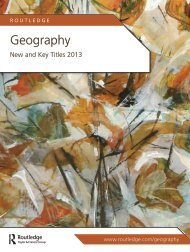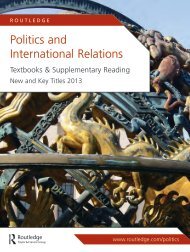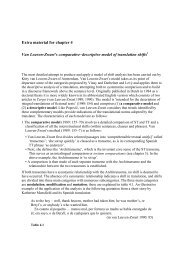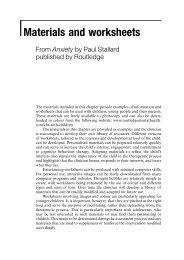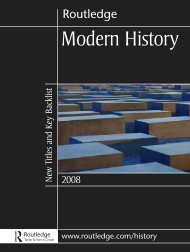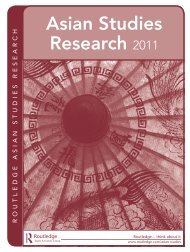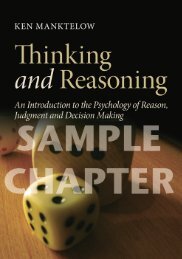Politics and International Relations 2011 (UK) - Routledge
Politics and International Relations 2011 (UK) - Routledge
Politics and International Relations 2011 (UK) - Routledge
Create successful ePaper yourself
Turn your PDF publications into a flip-book with our unique Google optimized e-Paper software.
72<br />
New<br />
iNterNAtioNAl PoliticAl ecoNomy<br />
The Future of Global<br />
Currency<br />
The Euro Versus the Dollar<br />
Benjamin J. Cohen, University of California, Santa<br />
Barbara, USA<br />
Can the euro challenge the<br />
supremacy of the U.S. dollar as<br />
a global currency? From the<br />
time Europe’s joint money was<br />
born, many have predicted that<br />
it would soon achieve parity<br />
with the dollar or possibly even<br />
surpass it. In reality, however,<br />
the euro has remained firmly<br />
planted in the dollar’s shadow.<br />
The essays collected in this<br />
volume explain why. Because of<br />
America’s external deficits <strong>and</strong><br />
looming foreign debt, the dollar can never be as<br />
dominant as it once was. But Europe’s money is unable<br />
to mount an effective challenge. The euro suffers from a<br />
number of critical structural deficiencies, including an<br />
anti-growth bias that is built into the institutions of the<br />
monetary union <strong>and</strong> an ambiguous governance structure<br />
that sows doubts among prospective users. As recent<br />
events have demonstrated, members of the euro zone<br />
remain vulnerable to financial crisis. Moreover, lacking a<br />
single voice, the bloc continues to punch below its<br />
weight in monetary diplomacy. The world seems headed<br />
toward a leaderless monetary order, with several<br />
currencies in contention but none clearly dominant.<br />
This collection distils the views of one of the world’s<br />
leading scholars in global currency, <strong>and</strong> will be of<br />
considerable interest to students <strong>and</strong> scholars of<br />
international finance <strong>and</strong> international political economy.<br />
Selected Contents: Introduction Part 1: The Global<br />
Currency System 1. Life at the Top: <strong>International</strong><br />
Currencies in the Twenty-First Century 2. The Euro <strong>and</strong><br />
Transatlantic <strong>Relations</strong> Part 2: The Euro Challenge 3. EMU<br />
<strong>and</strong> the Dollar: Who Threatens Whom? 4. Global Currency<br />
Rivalry: Can The Euro Ever Challenge the Dollar?<br />
5. Enlargement <strong>and</strong> the <strong>International</strong> Role of the Euro 6. The<br />
Euro in a Global Context: Challenges <strong>and</strong> CapacitiesDollar<br />
Dominance, Euro Aspirations: Recipe for Discord? 7. Dollar<br />
Dominance, Euro Aspirations: Recipe for Discord?<br />
Part 3: Glimpses of the Future 8. A One-<strong>and</strong>-a-Half<br />
Currency System 9. Toward a Leaderless Currency System<br />
10. The <strong>International</strong> Monetary System: Diffusion <strong>and</strong><br />
Ambiguity<br />
November 2010: 234 x 156: 208pp<br />
Hb: 978-0-415-78149-7: £90.00<br />
Pb: 978-0-415-78150-3: £24.99<br />
eBook: 978-0-203-83380-3<br />
For more information, visit:<br />
www.routledge.com/9780415781503<br />
Global Finance in Crisis<br />
The <strong>Politics</strong> of <strong>International</strong> Regulatory<br />
Change<br />
Edited by Eric Helleiner <strong>and</strong> Stefano Pagliari, both<br />
at University of Waterloo, Canada <strong>and</strong><br />
Hubert Zimmermann, Heinrich Heine University,<br />
Germany<br />
Series: Warwick Studies in Globalisation<br />
’How did we get to here?<br />
How did finance become so<br />
globalized, while those who<br />
regulate it became so<br />
fragmented? This excellent<br />
set of essays offers both an<br />
overview <strong>and</strong> a challenge to<br />
those interested in<br />
underst<strong>and</strong>ing the different<br />
institutions which regulate<br />
global finance. The<br />
contributors present the<br />
different corners of the<br />
world of financial regulation, including<br />
transnational networks, private sector<br />
arrangements, struggles of national interest,<br />
regional institutions <strong>and</strong> inter-governmental<br />
forums. The contributors sharply differ in how<br />
global finance will be transformed by the current<br />
crisis. Their differences give us a fascinating map to<br />
use in tracking current shifts in global financial<br />
regulation.’ - Ngaire Woods, University College,<br />
University of Oxford, <strong>UK</strong><br />
Selected Contents: Part 1: Issues <strong>and</strong> Structures<br />
Part 2: Countries <strong>and</strong> Regions<br />
2009: 234 x 156: 216pp<br />
Hb: 978-0-415-56437-3: £90.00<br />
Pb: 978-0-415-56438-0: £29.99<br />
For more information, visit:<br />
www.routledge.com/9780415564380<br />
Beyond States <strong>and</strong> Markets<br />
The Challenges of Social Reproduction<br />
Edited by Isabella Bakker, York University, Canada<br />
<strong>and</strong> Rachel Silvey, University of Toronto, Canada<br />
Series: RIPE Series in Global Political Economy<br />
Exploring difficult <strong>and</strong> crucial<br />
aspects of the transnational<br />
gender politics of globalization,<br />
this book provides a unique <strong>and</strong><br />
valuable introduction to the<br />
history of the concept of social<br />
reproduction from an<br />
inter-disciplinary perspective.<br />
2008: 234 x 156: 224pp<br />
Hb: 978-0-415-77585-4: £90.00<br />
Pb: 978-0-415-77586-1: £25.99<br />
eBook: 978-0-203-92849-3<br />
For more information, visit:<br />
www.routledge.com/9780415775861<br />
Global Economy Contested<br />
Power <strong>and</strong> Conflict across the <strong>International</strong><br />
Division of Labour<br />
Edited by Marcus Taylor, Queen’s University,<br />
Canada<br />
Series: Rethinking Globalizations<br />
Emphasizing the social<br />
processes that underpin the<br />
global economy <strong>and</strong><br />
demonstrating how the uneven<br />
effects of global economic<br />
integration impact upon actors<br />
this book also underlines the<br />
reciprocal effects that<br />
reconfigure the terrain of global<br />
accumulation.<br />
2008: 234 x 156: 272pp<br />
Hb: 978-0-415-77548-9: £90.00<br />
Pb: 978-0-415-77549-6: £24.99<br />
eBook: 978-0-203-92724-3<br />
For more information, visit:<br />
www.routledge.com/9780415775496<br />
ForthcomiNg<br />
Bilderberg People<br />
Elite Power <strong>and</strong> Consensus in World <strong>Politics</strong><br />
Ian Richardson, Andrew Kakabadse, Cranfield<br />
University, <strong>UK</strong> <strong>and</strong> Nada Kakabadse<br />
Bilderberg People explores the hidden mechanisms of<br />
influence at work in the private world, <strong>and</strong> personal<br />
interactions, of the transnational power elite. It is not<br />
concerned with conspiracy theories; instead it is about<br />
certain fundamental forces that shape the world in<br />
which we live. These forces, with their power to bring<br />
about transitions in emotion <strong>and</strong> preference within, <strong>and</strong><br />
beyond, the elite community have potentially profound<br />
implications for all of us.<br />
Through exclusive interviews with attendees of the most<br />
prestigious of all informal transnational networks –<br />
Bilderberg – this book provides a unique insight into the<br />
networking habits <strong>and</strong> motivations of the world’s most<br />
powerful people. Moreover, it demonstrates that elite<br />
consensus is not simply a product of collective common<br />
sense among the elite group; rather, it is a consequence<br />
of subtle power relationships within the elite circle.<br />
These relationships, which are embedded in the very<br />
fabric of elite institutions <strong>and</strong> interactions, result in a<br />
particular br<strong>and</strong> of enlightened thinking within the elite<br />
community. For the very first time, <strong>and</strong> through<br />
observance of strict anonymity, the personal accounts of<br />
transnational elite participants shed light on the critical<br />
question of who runs the world <strong>and</strong> why they run it the<br />
way they do.<br />
Selected Contents: Introduction 1. Transnationalism <strong>and</strong><br />
the Transnational Elite 2. Transnational Elite Interactions<br />
3. Elite Collaboration 4. Transnational Networks<br />
5. Consensus Formation 6. The Seductive Lure of Elite<br />
Membership 7. The Future of the Transnational Elite<br />
8. Conclusion<br />
June <strong>2011</strong>: 198 x 129: 208pp<br />
Hb: 978-0-415-57634-5: £80.00<br />
Pb: 978-0-415-57635-2: £20.99<br />
For more information, visit:<br />
www.routledge.com/9780415576352<br />
complimentary exam copy e-inspection New in Paperback companion Website



